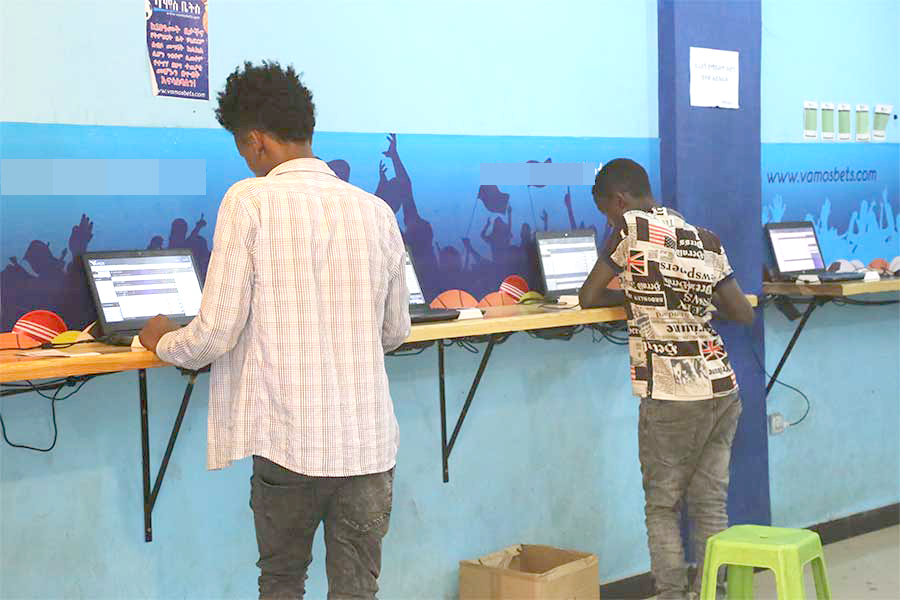
Fortune News | Dec 10,2022
On the rain-soaked streets of Addis Abeba, packs of stray dogs weave through alleys and puddles, their paws worn down on uneven stones. They cluster beneath tin awnings or the shade of parked cars, keeping wary eyes on pedestrians. Meals, when they come, are scraps found on the roadside. Even dogs with owners often spend their days tethered outside, loosely fed and seldom groomed. For many, care is a matter of survival, not comfort.
Just a few blocks away, a different scene unfolds at MoMo Dog Grooming Centre, a sanctuary that reflects another possibility for canine life in Ethiopia. Founded a year ago by Tigist Tesfaye, MoMo has introduced the idea of professional pet care to Addis Abeba. Inside, the sound of paws tapping polished floors mingles with the hum of dryers and the splash of baths. Dogs are washed, brushed, and trimmed with practised hands; nails clipped, ears cleaned, coats treated to shed loose fur and shine. Tail wags and soft barks replace the restless pacing seen outside.
Tigist's inspiration came during work trips abroad, when she wandered into a dog spa out of curiosity. The sight of pets receiving complete grooming services, from nail care to tooth brushing, surprised her.
"I couldn't believe what I was seeing," she recalls. "Dogs were getting their nails done, their hair styled, even their teeth brushed." She realised the skills required were far from simple, leading her back overseas for professional certification before launching MoMo in Addis Abeba.
The early days were not easy. The shop's location was often confusing to passersby, who frequently mistook it for an accessory store. Online promotions drew scepticism, with critics dismissing grooming as a luxury in a country facing economic strain.
"People insulted us and said this was unnecessary," Tigist says. "But we kept going, educating them, and staying patient." Today, MoMo has built a steady clientele and is planning to expand, with services for cats and other pets on the horizon.
MoMo now caters to breeds of all sizes, from small imported puppies to towering Dobermans. A complete grooming package ranges from 6,000 Br for smaller dogs to 10,000 Br for the largest, with individual services available at lower rates. To encourage uptake, customers receive a 30pc discount on complete packages. Beyond grooming, shelves are stocked with supplements, diapers, eye drops, toothbrushes, toothpaste, oral sprays, and milk, rounding out a vision of pet care that goes beyond the basics.
Eyoel Tsegaye, the centre's main groomer, observes that most of MoMo's clients are foreigners, while many Ethiopians still regard dogs primarily as guardians. Even so, MoMo handles at least two grooming sessions a day, each carried out by a trained team attentive to the well-being of every animal. Dogs leave the centre polished and calm, a striking contrast to the muddy strays roaming only a few streets away.
For much of Addis Abeba, a dog remains less a companion than a sentry. Kazanchis resident Mesafinit Kassahun has kept dogs for more than two decades, never purchasing one but taking in puppies from friends. His current dog spends the day tied to a small wooden shelter, released only at night to guard against thieves.
"I'm proud of my dog," Mesafinit says. "It never lets a stranger pass. If it sees an unfamiliar face, it barks or even bites."
Bathing or grooming has never been part of his routine. Scraps make up most of the diet, with meat given only on holidays or when the family buys some for themselves. Mesafint pays 40 Br to the butcher for some scrap meat.
"I don't beat it, and I don't let it go hungry. I don't see what more I can do." He said.
In contrast, others are adopting a different approach. Bruk Alemayehu owns two Havanese dogs, a rare breed from Cuba. A father of two toddlers living in an apartment near CMC, he spends between 6,000 Br and 10,000 Br per month on grooming, firmly convinced that hygiene is crucial for both his pets and his family.
"Dogs need to be taken care of properly, just like any other member of the family," he said.
He points out that dogs can suffer from dandruff and lice, and since they spend so much time with his children, keeping them clean is essential for protecting his kids' health. For him, this expense is not an indulgence but a necessity, and he hopes to see more such services become available across Addis Abeba.
Kurat Dog Grooming seeks to fill this demand with a home-to-home model. Founded nine months ago by Abigael Mesfin after struggling to wash her own pet, Kurat adapts its services to each dog's behaviour. Calm dogs are easier and cheaper to groom; aggressive ones cost more and, in rare cases, may require anaesthesia for safety.
Packages are tiered: the first offers bathing, haircut, and trim; the second adds flea and tick treatment with deep shampoo and conditioner; the third includes all prior services plus coat health checks, ear cleaning, and nail trimming. Prices range from 2,000 Br to 9,000 Br, depending on the package and the dog's temperament.
"Healthy paws mean a longer life," Abigael said.
The country's relationship with dogs extends well beyond grooming salons. Wondu Mengesha (MD), coordinator of the Veterinary Public Health Program, estimates that the country is home to around 10 million dogs. He classifies them into five groups: owned dogs, lost dogs, dogs kept outdoors, dogs without owners, and what he calls "community dogs."
"They are everywhere in our neighbourhoods, but they live without any real owner," he explains.
Community dogs make up the majority, surviving without direct care but sustained by scraps from residents. A growing challenge is how to manage the growing population of community dogs. Wondu emphasises sterilisation as a humane control method. He suggests that the Ministry must approve all clinical services for animals to guarantee standards of care.
The scale poses significant public health challenges. Wondu notes that 60 to 70pc of human diseases are animal-borne, and close contact with untreated dogs increases the risk. He said that rabies can be transmitted not only through bites but also through scratches. He also points to other diseases, such as parasites and Toxoplasma, that pose additional risks to humans and animals alike.
"Killing them will not solve the problem," Wondu says. "We must focus on vaccination sterilisation."
In 2015, the global United Against Rabies initiative pledged to eliminate all human deaths from dog-mediated rabies by 2030 through vaccination, managing populations, and educating communities. Local officials plan to vaccinate at least 70pc of dogs, a level that ensures rabies transmission is halted. Between 2022 and 2023, 140,000 dogs were vaccinated in regional cities; in the current year, that number has already reached 589,000.
Unlike in many other countries, where pet ownership requires clear criteria such as proof of financial stability and access to veterinary services, Ethiopia is still shaping a culture of responsible ownership. The country adopted an animal welfare and protection law last year, with regulations now being drafted in cooperation with the World Organisation for Animal Health.
The law requires owners to provide food, water, shelter, and basic veterinary care, and to handle animals humanely. It bans cruelty such as beating, neglect, or overworking, and outlaws painful husbandry practices. Special uses such as research, circuses, or zoos require prior certification from the Ministry. Stray animals, meanwhile, must be reported to veterinary officers or local administrations. To support these rules, animals are to be registered in a national identification and traceability system, vaccinated, and transported only with veterinary movement permits.
While public health initiatives focus on vaccination sterilisation, animal welfare advocates are addressing deeper cultural attitudes. Journalist-turned-activist Feven Meles has been campaigning for over seven years and recently rented an 800sqm plot to establish a shelter for strays. She works with the Ministry of Agriculture and international schools, convinced that changing how children view animals is crucial for long-term progress.
"Most people think feeding, washing, and giving a dog a safe place to sleep is a luxury," she says.
Feven's shelter currently houses 10 rescued dogs, with plans to expand capacity to thousands. Her team retrieves animals abandoned during moves to apartment complexes; 100 were found in Kazanchis alone during the second round of corridor demolitions. Each receives medical care before relocation. Adoption is permitted only under strict conditions: prospective owners must complete the necessary forms and agree to provide monthly video updates. If they fail, the shelter reclaims the dog. Animals with histories of abuse receive training to curb aggression before adoption.
"Loving dogs is not about status," she said, "It is about care."
Her work is financed by her personal savings and the proceeds from selling dog-themed T-shirts at local bazaars. Feven emphasises that dog ownership is a lifetime commitment, noting that while a dog's life spans 10 to 12 years, many owners are unwilling to pay 400 Br for essential vaccinations. She argues that some people prioritise status by purchasing imported breeds, overlooking the stray dogs in their own communities.
For Feven, the mission is clear: animals deserve freedom from starvation, neglect, and cruelty. Through school clubs, campaigns, and direct rescues, she argues that how society treats animals reflects its values. She calls for laws that punish those who harm or abandon animals.
"If we give them care," she says softly, "they will always give us joy in return."
PUBLISHED ON
Sep 07,2025 [ VOL
26 , NO
1323]

Fortune News | May 25,2019

Sunday with Eden | Mar 30,2024

Commentaries | Feb 27,2021

Agenda | Dec 10,2022

Fortune News | Mar 27,2021

Dec 22 , 2024 . By TIZITA SHEWAFERAW
Charged with transforming colossal state-owned enterprises into modern and competitiv...

Aug 18 , 2024 . By AKSAH ITALO
Although predictable Yonas Zerihun's job in the ride-hailing service is not immune to...

Jul 28 , 2024 . By TIZITA SHEWAFERAW
Unhabitual, perhaps too many, Samuel Gebreyohannes, 38, used to occasionally enjoy a couple of beers at breakfast. However, he recently swit...

Jul 13 , 2024 . By AKSAH ITALO
Investors who rely on tractors, trucks, and field vehicles for commuting, transporting commodities, and f...

Oct 18 , 2025
The political establishment, notably the ruling party and its top brass, has become p...

Oct 11 , 2025
Ladislas Farago, a roving Associated Press (AP) correspondent, arrived in Ethiopia in...

Oct 4 , 2025
Eyob Tekalegn (PhD) had been in the Governor's chair for only weeks when, on Septembe...

Sep 27 , 2025
Four years into an experiment with “shock therapy” in education, the national moo...